#Comprehensive Law against Violence
Text
First there was a protest against Femicide in Kenya that American news media barely covered. Now there was a protest in Honduras that was barely mentioned.
February 7, 2024
Dressed in black as a sign of mourning, about 300 women marched on Thursday in Tegucigalpa to the National Congress, on Honduran Women’s Day, to protest the increase in femicides.
“We come to demand that the lives of Honduran women be respected, that’s why we come to this National Congress,” an activist who covered her face and hair with black scarves said through a megaphone.
The police placed barriers around Congress as a new legislative period began with the attendance of President Xiomara Castro, but the protesters managed to jump over them and reach the lower part of the building.
“We are marching today against all violence, from domestic violence to femicide. We demand the approval of the Comprehensive Law against Violence that the president promised; we can’t wait,” said Sandra Deras.
According to the Women’s Rights Center, violence against women is on the rise in Honduras. In the first 15 days of 2024, at least 16 women were murdered (according to preliminary police reports there were 15).
According to the National Autonomous University of Honduras’ Violence Observatory, 380 femicides were registered in 2023, compared to 308 in 2022.
According to UN Women data, Honduras is the fifth country with the highest rate of femicides in the world, 6.47 per every 100,000 inhabitants, making it the most dangerous country for women in Latin America.
Congress established January 25 as Honduran Women’s Day because, on that date in 1955, women were granted the right to vote and participate in the country’s political life.
#honduras#Tegucigalpa#Femicide#January 25#Honduran Women’s Day#Comprehensive Law against Violence#In the first 15 days of 2024 at least 16 women were murdered#National Autonomous University of Honduras’ Violence Observatory#380 femicides were registered in 2023#compared to 308 femicides in 2022.#Honduras is the most dangerous country for women in Latin America#Honduran women were granted the right to vote in 1955#Anerican news channels need to cover more international news
260 notes
·
View notes
Text
One of the most common reasons I hear for people being against abortion is because “life is sacred.”
Really? Since when? When has life ever been sacred in this country?
If life is sacred, how come we don’t have universal healthcare?
If life is sacred, how come we don’t pass comprehensive gun laws so first graders don’t get gunned down in their classrooms?
If life is sacred, why don’t we offer paid maternal leave so mothers can actually take care of the babies that you are now forcing them to have?
If life is sacred, how come we don’t bat an eye when the police murder black kids?
If life is sacred, why do we have the highest maternal death rate in the developed world, which is only going to increase now that women are being forced to give birth?
If life is sacred, why is the death penalty even still a thing?
If life is sacred, why are we still encouraging violence against the LGBTQ+ community?
Life has literally never been sacred in this country. Maybe anti-choicers like to pretend that it is because it makes them feel righteous when in reality, they’re just misogynistic pieces of shit, but it’s not. And as long as psychotic, reactionary morons continue to steal power undemocratically and make decisions that the majority of us do not want, it never will be.
#roe v wade#roe v wade saves lives#abortion is healthcare#abortion rights#pro choice#womens rights#fuck the supreme court#fuck scotus#fuck anti choicers#pro abortion#blm#black lives matter#lgbtq#us politics
13K notes
·
View notes
Note
There's this weird thing going on Reddit right now where people are claiming that legally, Rhaenyra children are not bastards. And I was wondering if you agree or disagree. I think that people are just making up their own canon lore at this point.
Hi anon,
I think what gets kind of muddled in this discussion is what "legally" means in the context. Generally speaking, children born within wedlock are considered legitimate until proven otherwise. Now in the medieval world, it's not like you were issued a birth certificate that you could whip out and say see, it says right here who the father is! There were no DNA tests, it was all a matter of word, and by and large a woman's virtue was her word, and it was what kept her and her children protected within the framework of medieval marriage. But the reason why bastardy matters in this context is also important. It's not like Rhaenyra is trying to collect child support here, nor is she a common merchant's wife whose husband has decided just to roll with it. She's the heir to the throne and the parentage of her children is a matter of inheritance and dynastic succession, so it's not a situation where a legal loophole is particularly helpful as a gotcha. There is not at this point in history a comprehensive codified law that clearly defines what these terms mean and defines the rights and obligations of parents and children legitimate and illegitimate, mostly you have combinations of precedent, tradition, oath, and a healthy dose of might makes right.
(I saw another reply to this question in which the responded basically goes, "free yourself from the shackles of this construct! Marriage isn't real it's an oppressive institution and the idea of bastardy is made up, so let it go," and while it's true that marriage, legitimacy, etc. are all social constructs and not absolute states of being, they started off as having a functional purpose within a certain social framework. And this is a basic problem a lot of people have with George's world, it's not that we have to have the views of a 12th century French peasant, or that everything has to be historically accurate, but George chose the medieval world as a setting for a reason, and it's not just an aesthetic one. Characters in even a quasi-historical setting have to act within the constraints of that setting. We have to understand that people don't know what they don't know. The medieval world doesn't have any framework for the introduction of feminist ideals. Westeros hasn't even had a Christine de Pizan yet. You couldn't walk up to a medieval peasant woman and say "marriage is a tool of patriarchal oppression and bastardy is a social construct," they'd look at you like you had two heads. And so we have to acknowledge that you can't simply start dismantling existing social structures if the framework doesn't exist to replace them with something better that offers more protections for a broader group of people, and at this point it definitely doesn't. Making an exception for one very privileged woman does not mean progress for all women, instead it often means destabilization of the flawed system that does exist, and even more violence against those less powerful in order to enforce the exceptional status).
So from a medieval point of view, marriage was pretty much a non-negotiable for a woman. And women weren't simply getting married because they were pressured into it by their families or because their fathers were opportunistic assholes, they got married because unmarried women had no legal status or standing. In most places they could not sign contracts or own land. A woman could join the church or get married (or become a prostitute, but it's not like sex workers had freedoms or protections either). Divorce wasn't a thing, and annulment was hard to get and usually available only as a tool for men to set aside their wives. So, for all intents and purposes, once you were married, that was generally it, you were stuck for life (the upside is that widows did get a lot more freedom, so marrying an older guy and waiting it out was not a bad option sometimes, all things considered). But what marriage did provide was assurance that you and your children would be protected and provided for. Marriage was a practical agreement, involving dowries, inheritances, and alliances sealed in blood. And this is one of the reasons why bastards could not inherit. Inheritance for once's children was one of the few perks of a marriage for a woman (this is, incidentally, why Alicent is so pressed about her children being effectively disinherited. There is NO reason for her, as an eligible maiden of good standing, to marry a man who will not provide for her sons, king or not). And of course, a man's bastards are obvious and are disqualified from inheriting (setting aside legitimization because it is not nearly the easy out that people think it is). You can't really pass them off as legitimate because your wife clearly knows which children she gave birth to, whereas a man might be told he is the father of a child when that child's father is in fact someone else.
In a dynastic marriage, all of this becomes even more important. Marriages were made as alliances and to strengthen the ties between kingdoms or houses. A child seals the marriage agreement by binding two bloodlines and creating kinship bonds that will last beyond the current generation. Those kinship bonds can ensure peace between kingdoms at war, trade agreements, and military aid. Passing a bastard off as trueborn breaks that agreement; it violates the very principle by which the agreement was made. And in this context, it doesn't actually matter if the father claims the children as his, because in a dynastic marriage inheritance is not just a personal matter, it's a matter of the state. The truth matters to a great many people, more than just the immediate family. A lie doesn't become the truth simply because the liar isn't caught, and there's no statute of limitations or court ruling that will ever put the matter to rest for good. Passing off a bastard as trueborn destabilizes the succession and breaks the dynastic bonds that the marriage was meant to establish. When the bastard heir in question attempts to take the throne, it won't be a smooth transition.
So what does it mean that Laenor and Corlys agree to pass Rhaenyra's children off as trueborn? It means that their bastardy cannot be proven at the moment insofar as the legal father, Rhaenyra's husband, is playing along and covering for Rhaenyra, and Viserys is backing them up by giving this his "legal" stamp of approval. But again, our view that it's no one else's business but Laenor and Rhaenyra's and that Viserys "legalized" their status is very modern. Jaehaeyrs and Alysanne were not considered married in the eyes of the Westerosi until they'd had a bedding ceremony, that is, the consummation of their marriage was witnessed. Royal marriages and the children that come from them are a public matter because the succession affects everyone in the realm. Laenor, Corlys, and Viserys can protect those children in the short term, but Laenor and Corlys and Viserys won't live forever, and they could withdraw their support for those children and renounce them as bastards at any time. Harwin could admit to fathering them, Rhaenyra and Harwin could get caught in the act, or someone else close to them might confess. Sure right now the black faction are all one big happy family, but 20 years down the line when bastard Jace takes the throne over trueborn Aegon III? There are multiple people in the family who could confess to knowledge of the bastardy, including Aegon III himself. The bastardy is too obvious and there are too many legitimate heirs of both house Targaryen and house Velaryon getting pushed aside in favor of bastard born children for it to be an issue that simply disappears because Rhaenyra and Laenor say so.
So "legal bastardy" is a pretty meaningless concept when it comes to royal succession because it's not a matter that's going to be settled by some neutral third party in a court of law. What matters in the long run is not whether or not Laenor claimed the kids, what matters is whether or not the situation is questionable enough that people with the power to challenge it might challenge it. And we see even within the actual narrative of the Dance that this is indeed the case. There is already a situation brewing with the other branches of the Velaryon family who are rightfully pretty pissed to see their ancestral seat pass to someone with no blood ties to the family (and as an aside, people will say Vaemond was self-serving, and of course he was, but that doesn't make him wrong, and maybe Baela or Rhaena should have inherited instead, but neither they nor their father were pressing their claims because they were backing up the bastard claimants, so was Vaemond supposed to do that for them?). And yes the king and Rhaenyra can cry treason and they can kill Vaemond and cut out tongues, but using force to silence people for telling the objective truth is by definition tyranny, and that's exactly the sort of situation that would get the nobility nervous. Because if Rhaenyra has to silence people already and she's not even queen yet, what will Jace have to do when he takes the throne? That's the real problem, not the "legal" status of Jace and his brothers, but the practical ramifications of hiding the truth.
122 notes
·
View notes
Text
California Women’s Law Center 2024 Pursuit of Justice Awards
The California Women’s Law Center will host our annual Pursuit of Justice Awards reception and dinner on Tuesday, May 21, 2024, at Hotel Casa Del Mar in Santa Monica. We hope you will join us in recognizing phenomenal leaders who are working to promote equal opportunity for women and girls around the world.
Christen Press and Tobin Heath are history-making soccer players, World Cup Champions, Olympic Gold Medalists, equal pay trailblazers, and co-founders of RE-INC, a company built to reimagine a more inclusive and equitable future for all. As beneficiaries and champions of Title IX, and two of the most skilled soccer players in the world, Christen and Tobin have used their platform to advocate for equity in sports and are inspiring leaders working to ensure future generations of players benefit from increased support and more opportunity.
CWLC will also be honoring our Angel City Football Club, the women-owned Los Angeles’s National Women’s Soccer League team entering their third full season. Dedicated to players’ well-being on and off the field, Angel City FC created The Player 22 Program which invests in athletes’ post-player careers and their entrepreneurial endeavors, supports the development of and push to get more women into the business of sports, and addresses gender discrepancies in athletics.
For more than 30 years, CWLC has worked to protect, secure, and advance the civil rights of women and girls. We have advocated for and achieved policy change on a comprehensive range of issues including gender equality, Title IX enforcement, women’s health and reproductive justice, economic security, and violence against women.
45 notes
·
View notes
Text
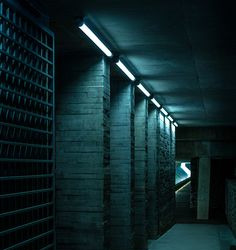
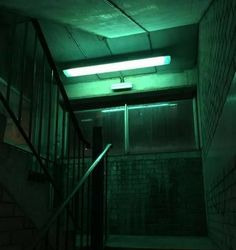
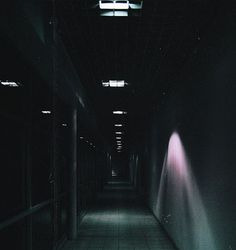

𝐀𝐥𝐜𝐚𝐭𝐫𝐚𝐳: 𝐂𝐞𝐥𝐥 𝟔𝟔
𝐒𝐲𝐧𝐨𝐩𝐬𝐢𝐬: In the shadowy annals of crime, a figure emerges, casting a chilling pall over the world. Eddie Munson, infamous for his macabre deeds as a serial killer, now stirs fear with an unprecedented proposal. Like a sinister weaver, Eddie prepares to embroider a fabric saturated with long-held vengeance. Whispers of his scheme cloak his intentions in darkness, leaving observers to ponder the depths of his depravity.
Each stitch in his plan weaves a sinister narrative, drawing the curious into the abyss of his psyche. As intrigue mounts, the world braces for Eddie Munson's cryptic request, poised to unravel reality itself, ushering forth chaos and terror.
𝐂𝐨𝐧𝐭𝐞𝐧𝐭 𝐖𝐚𝐫𝐧𝐢𝐧𝐠𝐬: +18 MDNI, gore, mentions of blood; violence, descriptions of torture and death, Eddie is a serial killer, cannibalism, cruelty, mistery, Eddie is on the death row, mentions Chrissy's mother and allusion to her death.
𝐀𝐮𝐭𝐡𝐨𝐫'𝐬 𝐍𝐨𝐭𝐞: Please be advised that this series of stories delves into darker and more disturbing themes than my previous works. The content will include highly sensitive and grotesque subject matter. If you find yourself uncomfortable with such material, it's perfectly understandable. Your well-being is paramount, and your decision to refrain from reading is respected.
𝐖𝐨𝐫𝐝 𝐂𝐨𝐮𝐧𝐭: 2,4K
𝐍𝐞𝐱𝐭 𝐂𝐡𝐚𝐩𝐭𝐞𝐫.
Fell free to support my works with some 𝐊𝐨-𝐅𝐢!

In the somber depths of the penitentiary's labyrinthine corridors, where the very air seemed to congeal with foreboding, the flickering glow of pale moonlight dared not venture. Within these subterranean confines, an imposing edifice of concrete and steel stood sentinel, its walls steeped in the crimson stains of untold atrocities perpetrated by the merciless hands of those who had transgressed against the sanctity of innocent lives. This fortress, a bastion of unforgiving incarceration, cast its shadow over all who dared to tread its bleak corridors, an inescapable abyss of despair and anguish.
Descending further still, into the bowels of this infernal domain, lay the deepest recesses of confinement - a purgatory reserved for the most depraved and desolate souls. Here, shrouded in perpetual darkness and devoid of even the faintest glimmer of sunlight or human contact, languished men and women so irredeemably profane that they had become naught but spectral echoes of their former selves. Condemned to an eternity of solitude and torment, they withered away in the suffocating embrace of isolation, their existence a cruel mockery of the vibrant world they once knew.
Amidst this realm of despair and desolation, a singular figure loomed in the shadows - the enigmatic inmate of Cell 66, a nameless specter whose very presence invoked dread and apprehension. Eddie Munson, a man cloaked in the chilling aura of mystery, stood as an epitome of cold-blooded savagery, his nefarious deeds shrouded in the veils of silence and secrecy. For a decade, he had steadfastly refused to divulge the twisted tapestry of his dark past, his lips sealed with an iron resolve that defied the relentless interrogation of law enforcement.
Eddie Munson, age of 28, stood accused of crimes so heinous and grotesque that they defied comprehension - murder, slaughter, torture, and the ultimate depravity of cannibalism. The latter having as victim his father, William Munson, the man had his heart ripped out of his body while he was still breathing, and eaten by his own son.
His victims, numbering unknown, bore the indelible mark of his sadistic cruelty, their anguished cries silenced forever in the abyss of oblivion. Yet, despite the relentless onslaught of interrogation and torture, Eddie remained an impenetrable enigma, his psyche a labyrinthine maze of madness and malevolence that confounded even the most seasoned investigators.
In a desperate bid to extract the truth from him, they exhausted every tool in the arsenal of human torment. Shock therapy surged through his veins like bolts of lightning, while hypnosis sought to unravel the tangled web of his mind. Sleep deprivation gnawed at his sanity, each minute stretching into an eternity of agony. Temperature manipulation plunged him into the icy depths of despair, while purposeful drowning submerged him in a watery abyss of terror.
Yet, despite their relentless efforts, the truth remained elusive, shrouded in the darkness of his twisted psyche. As the investigators and police faced the grim reality of their failure, they reluctantly conceded defeat. With heavy hearts and haunted souls, they consigned him to the unforgiving confines of death row, where the specter of execution loomed ominously over him like a shadowy executioner awaiting his final reckoning.
Perched upon a cold, unforgiving chair, Eddie Munson found himself shackled before a cadre of stern-faced law enforcement officials. The putrid hue of his garb, a garish orange jumpsuit, seemed to mock the gravity of the situation, its color reminiscent of flames licking at the edges of his very existence.
As he awaited his fate, the weight of his crimes hung heavy in the air, a palpable presence that suffocated the room with an oppressive sense of dread. The gaze of the officers bore into him with a mix of contempt and morbid fascination, as if they were peering into the depths of a bottomless abyss, searching for a glimmer of humanity amidst the darkness.
The clang of metal against metal echoed through the chamber as the handcuffs tightened around his wrists, a stark reminder of his loss of freedom and impending doom. And yet, despite the grim tableau unfolding before him, Munson remained eerily composed, his eyes betraying no hint of remorse or regret, but instead, harboring a chilling calmness that sent shivers down the spines of those who dared to meet his gaze.
"I, Judge William Bennet Carver," the judge's voice reverberated through the solemn courtroom, each syllable weighted with the gravity of the impending verdict, "sentence Edward James Munson for the heinous crimes of murder, slaughter, cannibalism, torture, concealment of a corpse, violence, and femicide, to face the ultimate justice: the electric chair."
The resounding thud of the judge's gavel against the polished wood punctuated his decree, sending a chilling ripple through the hushed chamber. Yet, amid the somber atmosphere, a twisted smirk danced upon Eddie's pallid visage, his lips curling into a sinister grin that betrayed a morbid amusement at his own demise.
The dim light of the courtroom cast eerie shadows across his features, accentuating the gleam in his eyes that flickered with an unsettling blend of defiance and derangement. To Eddie, the solemn pronouncement of his fate seemed to serve only as fuel for the perverse amusement that bubbled within him, a dark amusement born of a mind steeped in darkness and depravity.
As the weight of his sentence settled upon him like a suffocating shroud, Eddie's gaze remained locked upon the judge, his expression an unsettling mixture of defiance and amusement. For in the face of impending doom, he found only a perverse delight in the twisted game of fate that had brought him to this chilling juncture.
Before the attendees could muster the resolve to depart the trial chamber, a chilling silence settled over the room like a suffocating fog. Yet, amidst the palpable tension, a voice shattered the eerie stillness, cutting through the air with an unsettling cadence that sent shivers down the spines of those present.
It was Eddie, his voice devoid of the usual satisfaction that accompanied his macabre deeds, each word dripping with a cold detachment that belied the horrors lurking within his psyche. As if emerging from the depths of a nightmare, his utterance hung heavy in the air, a spectral presence that seemed to linger long after the sound had faded.
The unexpectedness of his speech sent shockwaves through the gathered throng, their eyes widening in disbelief at the audacity of this monstrous figure to break the oppressive silence that had enveloped the chamber. And yet, despite the chill that coursed through their veins, there was an undeniable allure to Eddie's words, a morbid curiosity that compelled them to hang upon his every syllable, like moths drawn to the flame of his dark presence.
For in that moment, Eddie Munson stood as a harbinger of terror, his voice a haunting echo of the abyss from which he had emerged, leaving all who bore witness to wonder what other horrors lay concealed within the depths of his twisted mind.
"Before you lend me to my inevitable fate," Eddie's voice sliced through the heavy air, his tone carrying an unsettling calmness that seemed incongruent with his looming demise, "there is a final thing I must ask."
The twisted curvature of his lips formed a grotesque grin, a stark contrast against the grim backdrop of the courtroom. His smile, more akin to a rictus of madness, sent shivers coursing down the spines of those assembled, each icy caress leaving behind a trail of apprehension and dread.
The macabre spectacle of Eddie's grin seemed to warp the very fabric of reality, casting a pall of unease over the room as if the darkness within him threatened to consume all who dared to behold it. And yet, despite the visceral discomfort it elicited, there was an undeniable magnetism to his presence, drawing the gaze of onlookers like moths to the flame of his twisted charisma.
For in that moment, Eddie Munson stood as a specter of malevolence, his smile a haunting reminder of the horrors that lurked within the depths of his depraved soul. And as the weight of his words hung heavy in the air, the gathered throng braced themselves for the chilling revelation that awaited, knowing all too well that whatever he had to say would only serve to deepen the darkness that enveloped them all.
“Nothing you say will save you, Mr. Munson.” Judge Carver said seriously.
"Indeed, Judge Carver," Eddie's voice echoed through the chamber, carrying an eerie calmness that seemed to mock the severity of his situation. His gaze, like obsidian pools devoid of remorse, bore into the judge with an unsettling intensity, as if daring him to peer into the abyss of his twisted psyche.
A grim chuckle escaped Eddie's lips, its echo reverberating off the walls like a sinister melody. "Save me?" he mused, the words dripping with a venomous disdain that sent a shiver down the spine of all who heard. "Oh, dear judge, salvation is but a distant memory in the shadowed recesses of my existence."
The air seemed to thicken with tension as the weight of Eddie's words hung heavy in the room, casting a pall of unease over the gathered throng. And yet, despite the palpable discomfort that permeated the chamber, there was an undeniable allure to his defiance, a morbid fascination with the darkness that lurked within him.
For in that moment, Eddie Munson stood as a testament to the depths of human depravity, his words a chilling reminder of the horrors that lay concealed within the darkest corners of the human soul. And as the judge's stern gaze bore down upon him, Eddie met it with a steely resolve, knowing full well that no words could save him from the abyss into which he had willingly descended.
"I want my story to be told to the world," Eddie's voice sliced through the tense atmosphere of the courtroom, each syllable laden with a sinister promise that sent a shiver down the spine of every witness. Gasps of shock rippled through the room, eyes widening in disbelief as if Eddie had uttered a profanity that defied comprehension.
"But... on one condition," he continued, his words hanging in the air like a heavy fog, suffocating all who dared to breathe in their ominous implications. The palpable anxiety in the room intensified, a suffocating weight pressing down upon the gathered throng, rendering them paralyzed in a state of morbid anticipation.
The silence that followed was deafening, a tangible presence that seemed to fill the room with a foreboding sense of dread. Each heartbeat thundered in their ears like a drumbeat of impending doom, the rhythm echoing the pulse of their mounting fear.
And then, with a voice that cut through the silence like a blade, Eddie delivered his chilling demand: "Bring her to me." The words hung in the air like a curse, casting a shadow over the room as the gravity of his request sank in. In that moment, the darkness that lurked within Eddie Munson's twisted soul spilled forth, enveloping all who bore witness in its malevolent embrace.
As Eddie's demand reverberated through the room, a hushed murmuring rose among the spectators, whispers of unease intertwining with the palpable tension that gripped them all. Judge Carver, his brow furrowed with concern, exchanged a glance with the bailiffs, uncertainty etched in their solemn expressions.
Suddenly, from the back of the courtroom, a figure emerged, cloaked in shadows and bearing an aura of ominous dread. It was a woman, her features obscured by darkness, yet her presence radiated an eerie calmness that seemed to quell the rising panic.
With measured steps, she approached the bench, her gaze fixed upon Eddie with an intensity that bordered on obsession. And as she drew closer, the dim light revealed the haunting familiarity of her visage—a haunting resemblance to one of Eddie's victims, long thought to be lost to the annals of his depravity.
A collective gasp swept through the room as the truth dawned upon them all, a revelation so horrifying that it threatened to shatter the fragile facade of their reality. For in that moment, it became clear that Eddie's request was not merely a macabre whim, but a sinister plot to unleash a new chapter of terror upon the world—one that would plunge them all into the depths of darkness from which there could be no escape.
"It's about time I found you, Munson," the words cut through the air like a frigid wind, each syllable dripping with a chilling resolve that sent shivers down everyone's spine. The voice, belonging to a middle-aged woman, resonated with an underlying tremor, hinting at the depths of her pent-up anguish and fury.
Eddie's gaze locked onto the woman, his expression unreadable yet tinged with a flicker of recognition that danced behind his steely facade. The name she uttered—Selenne Cunningham—stirred a distant memory within him, a memory veiled in the shadowy recesses of his consciousness.
A sinister smile curled at the corners of Eddie's lips, a perverse amusement twinkling in his eyes like the glint of a predator stalking its prey. "Ah, Selenne Cunningham," he purred, his voice laced with a venomous edge that mirrored her own icy tone. "Your daughter... such a delicate flower, crushed beneath the weight of my artistry."
The room fell silent, the tension thickening with each passing moment as the gravity of their confrontation hung heavy in the air.
With the first thread of Munson's sinister plot meticulously woven, the tendrils of his malevolence unfurled like a dark shadow, poised to ensnare those who unwittingly danced within its grasp. The nefarious machinations of Eddie Munson, honed to a razor's edge, stood poised to carve a path of unfathomable destruction through the lives of all who had dared to cross his path.
As the tendrils of his wickedness coiled with calculated precision, a palpable sense of foreboding descended upon those ensnared within the web of his deceit. Edward Munson, a specter of malevolence risen from the depths of darkness, loomed large on the horizon, his presence casting a long shadow that threatened to engulf all who stood in his wake.
With a chilling resolve that echoed through the corridors of fate, he returned from the abyss, his resolve steeled by the bitter taste of past failures. This time, there would be no room for error, no margin for mercy.
Eddie Munson had returned, and with him came a reckoning so dark and terrible that none would emerge unscathed.
#darknesseddiemfics#eddie munson x reader#eddie munson#eddie munson fanfic#eddie munson x y/n#eddie munson x you#eddiemunson#dark!eddie munson#eddie munson x f!reader#eddie munson smut#eddie stranger things#eddie x reader#eddie munson angst#eddie munson stranger things#eddie munson imagine#bestfriend!eddie munson#older!eddie munson#eddie the freak munson
35 notes
·
View notes
Text
The Laws of Fandom Protect Whiteness.
Disclaimer: I do think that fandom only works if people stick to the Three Laws of Fandom, i.e. SALS, DL;DR, and YKINMK. I am anti-anti and I believe that writing problematic things does not make you problematic in real life. Basically: I'm on your side, fellow fic writers.
But there is a caveat. We have to remember why the Three Laws exist. They are there so that fandom is a safe space for everyone. So it can be a place we all come to and feel respected and heard. But this undoubtedly privileges White people.
The Three Laws of Fandom will inherently protect White people's safety because we don't have to worry about unconscious bias or racist conditioning towards our race or ethnicity. The Three Laws of Fandom do not inherently protect People of Colour because White people in fandom will have forms of racist bias that we have to unlearn. Therefore, the Laws only work if White people choose to be actively anti-racist and listen to POC in the fandom.
Let's expand on this.
This is not saying that writing racism, or writing racially-charged themes, should be censored or off-limits to White people. But when we do write them, we need to remember that the Laws also only work because fandom operates on a comprehensive tagging system. We are able to enforce DL;DR because we have tags showing us exactly what is in the fic. Therefore - don't like age difference? Don't like non-con? Don't like violence? You can opt out!
But if you write racially-charged themes and don't give appropriate content warnings, then you aren't giving POC the chance to opt out. In fact, you are endangering their mental and emotional safety by pulling them into subject matter that has real-world implications for them. And yes, entering fiction always carries a risk of reading something that you don't like - but is far more dangerous for POC than for White people.
It is one thing to accidentally read a fic that depicts a kink you don't like, it is another for a POC to read their own experiences being depicted in a way that makes them out to be no big deal, and not even a big enough deal to be appropriately tagged.
It is also important to note that a POC alerting you to racist themes or passages in your work and asking you to appropriately tag or consider the way you wrote them isn't the same as them flaming you. In fact, it shows care. This person thinks that you are worth their time and effort to try and have a conversation with. If you shut that down and prioritise your right to write anything you want above someone's safety, that is a racist act.
This type of racism results in people like Stitch's Media Mix taking a hard line against the Laws altogether, as they are so regularly used as excuses by White people to justify racism. While I disagree with Stitch's ultimate conclusion, can I blame her for how they got there? The Laws have certainly never been leveraged against me to dismiss my lived experience or concerns, and have only contributed to fandom being a safer space for me. But Stitch is Black and speaks about antiblackness and racism in fandom - and gets barrages of death threats and hate mail for doing so, from fans participating in these spaces.
How are we supposed to tell POC that the Laws keep their spaces safe when they so clearly do not?
On a related note, I think the prioritisation of ✨positivity✨ over any sort of critique or conversation is another mechanism to protect Whiteness. It's important to remember that particularly in slash fandoms, the majority of fans tend to be white queer AFABs or genderqueer people, so the normal structures of patriarchy and heteronormativity that we navigate in our regular lives don't enter into fandom as pervasively. Whiteness, however, is the oppressive structure that tends to persist in slash fandoms, and therefore we need to be cognisant of how this can marginalise and isolate POC fans.
If you avoid difficult, race-based conversations because you only spread "positivity", then you do not actually care about everyone in fandom having a positive experience.
Paraphrasing from 'Conflict is Not Abuse' by Sarah Schulman, conflict isn't inherently bad. It's productive. It shows care. It's growth.
The Laws of Fandom can and should work for everyone. But we are the actual enforcers. We have to recognise the potential ways people can abuse the Laws to marginalise, threaten and isolate POC fans.
People of Colour deserve a seat at the table of fandom. They deserve a safe space. They deserve to feel wanted and seen and respected.
I don't have all the solutions for this - I'm White and recognise that everything I'm saying here I only learned from POC and have probably not said it as well or as eloquently as they have been doing (but no one's listening). I welcome any additions, critiques or insights from POC to this post.
The type of fandom I want to cultivate is safe and inclusive for everyone, and we need to start thinking about what that actually means.
625 notes
·
View notes
Text
China underwent rare scrutiny of its human rights record at the United Nations on Tuesday.
The Universal Periodic Review (UPR), which all UN member states must undergo every five years, focused on Xinjiang, a remote region where China has incarcerated more than 1 million Uyghurs and other Muslim minorities and is accused of crimes against humanity.
The political situation in Hong Kong, where Beijing has imposed a strict set of "security" laws, was also taken into consideration.
More than 160 countries addressed the hearing in Geneva, Switzerland, and each only had 45 seconds to speak.
China once again denied any allegations of human rights abuses.
"We embarked on a path of human rights development that is in keeping with the trend of the times and appropriate to China's national conditions and scored historic achievements in this process," China's UN Ambassador Chen Xu said through an interpreter at the meeting.
Uyghur and Tibetan groups each held small protests outside the UN offices in Geneva.
Western countries slam Beijing
Canada's representative to the UN, Leslie Norton, called on China to end "all forms of enforced disappearances targeting human rights defenders, ethnic minorities and Falun Gong practitioners" and to repeal the controversial security law in Hong Kong.
Danish UN ambassador Ib Petersen called on Beijing to implement UN recommendations in Xinjiang and to "release writers, bloggers, journalists, human rights defenders and others arbitrarily detained for exercising their right to freedom of expression, and guarantee this right, including in Hong Kong."
Meanwhile, Czech ambassador Vaclav Balek also urged China to "end the criminalization of religious and peaceful civil expression by ethnic and religious groups — including Muslim, Uyghurs and Buddhists, Tibetans and Mongolians — under the pretext of protecting state security" and "stop cross-border kidnappings and intimidating Chinese citizens living abroad."
Germany, Japan and Ireland also called for better protections of minorities in Xinjiang and Tibet.
Praise for China
Diplomats told Reuters news agency that China had pressured its supporters to fill up their allotted speaking time with praise.
First secretary Ilia Barmin of Russia's diplomatic mission advised China "to consistently improve the understanding and capacity of citizens to use standard spoken and written Chinese in Xinjiang."
South Africa's political affairs counselor Frankye Bronwen Levy called on China to strengthen laws against domestic violence that were introduced eight years ago.
The Indian representative, meanwhile, urged Beijing to "continue taking steps to ensure fullest enjoyment of basic human rights by its people, through inclusive and sustainable development."
Some African countries like Ethiopia and Cameroon lauded China's efforts on human rights.
Eritrea's representative for instance urged China to "to comprehensively promote ethnic unity and progress."
Iran also praised China's "national action plan for human rights," while Bolivia commended China's efforts against deforestation.
18 notes
·
View notes
Text

13 October 2023: King Abdullah II, receiving US Secretary of State Antony Blinken, stressed the need to open humanitarian corridors to allow for the delivery of medical and relief aid into Gaza, while protecting civilians and working to end the escalation and the war on Gaza.
He said the work of international agencies in the Gaza Strip must not be hindered, to enable them to perform their humanitarian duties, stressing the importance of stepping up international efforts to end the escalation in Gaza and its surroundings and prevent a further deterioration of the situation and its spillover into the West Bank.
His Majesty warned of any attempt to forcibly displace the Palestinians from all the Palestinian Territories or to cause their internal displacement, calling for preventing a spillover of the crisis into neighbouring countries and the exacerbation of the refugee issue.
The King warned of inflicting collective punishment against Gaza residents, urging the protection of innocent civilians on all sides, in line with shared human values, international law, and international humanitarian law. (Source: Petra)
His Majesty reiterated the need to create a political horizon to guarantee the prospects for just and comprehensive peace on the basis of the two-state solution, and prevent the eruption of more cycles of violence and war in the region.
The King stressed the need to preserve the historical and legal status quo in Islamic and Christian holy sites in Jerusalem, noting the continued efforts to safeguard these holy sites under the Hashemite Custodianship.
Deputy Prime Minister and Foreign Minister Ayman Safadi, Director of the Office of His Majesty Jafar Hassan, General Intelligence Department Director Maj. Gen. Ahmad Husni, and US Ambassador to Jordan Yael Lempert attended the meeting.
Earlier, Safadi had met with Blinken and discussed efforts to end the dangerous escalation and ensure the provision of humanitarian aid to the Gaza Strip.
26 notes
·
View notes
Text
The MAGA GOP firmly believes that violence and violent threats against their fellow Americans is the surest path to power. As David French explains, that's a huge problem. In 2021, Reuters published a horrifying and comprehensive report detailing the persistent threats against local election workers. In 2022, it followed up with another report detailing threats against local school boards. In my own Tennessee community, doctors and nurses who advocated wearing masks in schools were targets of screaming, threatening right-wing activists, who told one man, “We know who you are” and “We will find you.”
My own family has experienced terrifying nights and terrifying days over the last several years. We’ve faced death threats, a bomb scare, a clumsy swatting attempt and doxxing by white nationalists. People have shown up at our home. A man even came to my kids’ school. I’ve interacted with the F.B.I., the Tennessee Department of Homeland Security and local law enforcement. While the explicit threats come and go, the sense of menace never quite leaves. We’re always looking over our shoulders. And no, threats of ideological violence do not come exclusively from the right. We saw too much destruction accompanying the George Floyd protests to believe that. We’ve seen left-wing attacks and threats against Republicans and conservatives. The surge in antisemitic incidents since Oct. 7 is a sobering reminder that hatred lives on the right and the left alike.
But the tsunami of MAGA threats is different. The intimidation is systemic and ubiquitous, an acknowledged tactic in the playbook of the Trump right that flows all the way down from the violent fantasies of Donald Trump himself. It is rare to encounter a public-facing Trump critic who hasn’t faced threats and intimidation. The threats drive decent men and women from public office. They isolate and frighten dissenters. When my family first began to face threats, the most dispiriting responses came from Christian acquaintances who concluded I was a traitor for turning on a movement whose members had expressed an explicit desire to kill my family. But I don’t want to be too bleak. So let me end with a point of light. In the summer of 2021, I received a quite direct threat after I’d written a series of pieces opposing bans on teaching critical race theory in public schools. Someone sent my wife an email threatening to shoot me in the face.
My wife and I knew that it was almost certainly a bluff. But we also knew that white nationalists had our home address, both of us were out of town and the only person home that night was my college-age son. So we called the local sheriff, shared the threat, and asked if the department could send someone to check our house. Minutes later, a young deputy called to tell me all was quiet at our home. When I asked if he would mind checking back frequently, he said he’d stay in front of our house all night. Then he asked, “Why did you get this threat?”
I hesitated before I told him. Our community is so MAGA that I had a pang of concern about his response. “I’m a columnist,” I said, “and we’ve had lots of threats ever since I wrote against Donald Trump.”
The deputy paused for a moment. “I’m a vet,” he said, “and I volunteered to serve because I believe in our Constitution. I believe in free speech.” And then he said words I’ll never forget: “You keep speaking, and I’ll stand guard.”
I didn’t know that deputy’s politics and I didn’t need to. When I heard his words, I thought, that’s it. That’s the way through. Sometimes we are called to speak. Sometimes we are called to stand guard. All the time we can at least comfort those under threat, telling them with words and deeds that they are not alone. If we do that, we can persevere. Otherwise, the fear will be too much for good people to bear.
13 notes
·
View notes
Text
Beijing has condemned what it called a “heinous attack” on a Gaza hospital that brought the Palestinian death toll to nearly 3,500, and it warned that the region will be “engulfed” without a complete ceasefire.
Chinese ambassador Zhang Jun delivered China’s statement to the UN Security Council on Wednesday as Washington voted amid the Israel-Gaza war against a United Nations resolution to provide humanitarian aid to Palestinians.
During the Security Council’s emergency briefing on Wednesday – a day after a deadly blast on Al-Ahli hospital killed hundreds of civilians and medical workers – Zhang denounced an “indiscriminate use of force” and urged Israel to “effectively fulfil its obligations under international humanitarian law”. The Israeli military has denied claims it was behind the attack.
“Developments over the past few days have amply demonstrated that an immediate and comprehensive ceasefire must be the overriding priority … Without a comprehensive ceasefire, any amount of humanitarian assistance will be a drop in the bucket,” Zhang said in a strongly worded statement to the council.
“If the current fight in Gaza is allowed to drag on, the end result will not be a complete military victory for any side, but rather most likely will be a catastrophe that will engulf the entire region, that will probably completely end the prospect for the two-state solution,” Zhang said.
China’s embassy in Israel has advised its nationals to leave the country or return to China as soon as possible to “avoid risks and ensure safety”, especially while commercial flights are still operating.
At an earlier vote, the United States was the only country in the 15-member council to veto a Brazil-sponsored resolution to condemn all violence against civilians in the war and urge humanitarian aid to Palestinians in Gaza. Russia and Britain abstained.
“Arab countries have issued a strong call for an immediate and comprehensive ceasefire. The international community should heed this just call of Arab countries and the Palestinian people, and unite all diplomatic efforts towards this goal,” said Zhang, who warned against plunging the Israeli and Palestinian people into “a vicious cycle of hatred and confrontation”.
The conflict had been brewing for decades before Hamas’ surprise attack on October 7, during which the disparity of force and casualties between Israel and Palestine widened as more Palestinian territories were occupied. According to UN numbers, between 2008 and just before the current conflict began, 6,407 Palestinians were killed compared with 308 Israelis.
Zhang further suggested that Palestinians were left with few options to survive Israel’s carpet bombing, stressing that “the basic needs of the people in Gaza must be ensured”.
“Tens of thousands of people have been forced to move south because of the emergency evacuation order issued by Israel, only to suffer from air strikes in the south as well,” Zhang said, noting Israel’s total siege of water, electricity and fuel in the Gaza Strip.
Since its occupation of the West Bank in 1967, Israel has controlled all water resources and water-related infrastructure. Water consumption by Israelis is at least four times that of Palestinians living in the occupied territories, according to Amnesty International.
Supplies, electricity and humanitarian aid into the Gaza Strip are similarly controlled by Israel.
23 notes
·
View notes
Text
"but bnha is good, it's saying that people make mistakes because of their circumstances but they can change for the better and redeem themselves, even if they've hurt people!"
which is, like, fine as a concept. but in the end bnha still hinges on the premise that harm is divided into "crime" and "not crime," and "crime" deserves punishment and jailtime, while any harm that is "not crime" can be dealt with between the affected parties and ANY outside action (including loss of professional status, for example) is disproportionately vindictive. bnha's division of "crime" and "not crime" isn't even good or consistent, e.g. gentle criminal's property crimes condemns him to jail while endeavor's domestic violence remains unaccounted for outside of his family's personal decisions, and lady nagant's... everything(?) being deemed some sort of undefined villainy while hawks' doing basically everything she did being conveyed as righteousness.
which i guess it bears saying that i'm a prison abolitionist and don't believe in the legal construct of "crime" anyway, but the inconsistency in bnha of what's "bad" and what isn't is simultaneously wild but also perfectly comprehensible. bnha constantly makes exceptions for and justifies the harms done by its hero characters; this is necessary in order for bnha's society AND the readers to accept the heroes' monopoly on violence, that they are the only ones allowed to use violence because their profession renders their violence as ontologically different than that of villains or civilians, and therefore justified.
bnha also doesn't really contend with the systemic issues that gave rise to many of the main villains, including the inclination to look away from overt suffering, the culture of abuse apologism, poverty, and discrimination against mutants. bnha is aware that those problems are there, but it has nothing to offer for solving them, improving upon those issues, or even just wrestling with what they mean—because bnha follows the pov of heroes, it can't.
the role of heroes in bnha is, like police irl, to use (the threat of) violence to enforce laws. bnha itself doesn't really question our existing notions of law and crime, and the only thing it adds is a sprinkle of some fantasy laws about quirks, but that's about it. the idea of legality and justice in bnha is largely congruent with what we understand as lawful today—it adheres to the status quo and enforces it. heroes are beholden to the law, and the law is beholden to the status quo. that is why heroes have nothing to offer for poverty or abuse or discrimination, other than encouraging its victims to do better. nor do they perceive poverty, abuse, or discrimination to be a harm in the way "crime" is, so there's no expectation for anyone or anything to be accountable towards those victims, as opposed to villains who are treated as people who need to repay a debt to society. lastly, the choice bnha presents for its villains to redeem themselves is through no other mechanism than joining the policing class, joining them to enforce the status quo.
so while bnha may be about personal growth and change, owning up to mistakes and the harm you've caused, it's very selective about WHO needs to change and WHAT kinds of things are harmful. underneath all of that too is its foundation of existing notions of crime, policing, and imprisonment, which only serve to further entrench class society, ethnic supremacy, imperialism, and state violence. that's why its supposedly "good" message falls short—it obviously doesn't apply equally to all characters, and the end goal of betterment is quite transparently assimilation into the status quo.
86 notes
·
View notes
Text
Nadra Nittle and Candice Norwood at The 19th:
The murders of Nicole Brown Simpson and her friend Ron Goldman led to one of the country’s most watched legal cases: The football superstar O.J. Simpson stood accused of killing his ex-wife and Goldman in a trial that sparked widespread debate about the power of celebrity, the inadequacies of the criminal justice system and the significance of his race.
Following news of O.J. Simpson’s death on Wednesday from cancer complications, experts revisited how the murders and subsequent trial reshaped discussions of domestic violence — and the ways racial dynamics complicated them.
Some said the country saw a major shift on a subject that had historically been framed as a private matter.
“When those murders happened, it really forced folks to take a look at domestic violence, what it really means to families, how dangerous it is,” said Charmine Davis, director of family wellness at the Jenesse Center, a domestic violence prevention and intervention nonprofit in Los Angeles. “It changed the way bills are passed and how politicians, police and the whole system looked at domestic violence.”
Others said the case primarily amplified a harmful reality that continues today in entertainment and beyond.
“I don’t think that any inroads have been made in terms of the criminal legal system, because I don’t think it’s possible,” said Myriam Gurba, author of the book “Creep: Accusations and Confessions,” which includes essays about gendered violence. “I know that the criminal legal system does not exist to manufacture justice for battered women. I believe that the purpose of a system is what it does.”
The legacy of this case — however inconsistent it may be — advanced national conversations that were rarely visible at such widespread levels.
Just months after the June 12, 1994, murders of Brown Simpson and Goldman, Congress passed the Violence Against Women Act (VAWA). The law stands out as the first comprehensive federal legislation designed to stop battery, sexual assault and other forms of violence targeting women. For years, advocates had unsuccessfully pushed to get the law enacted. The awareness Brown Simpson’s murder raised about intimate partner violence helped to get VAWA much-needed backing from lawmakers, supporters of the legislation said.
More broadly, advocates reported at the time that the number of donations to battered women’s shelters and other women’s organizations rose nationwide. The number of calls to shelters also increased, indicating that more women were comfortable coming forward about their abuse.
After her murder, the public learned the extent of the abuse Brown Simpson endured. She stored items in a safe deposit box at a bank: It included three photos of herself with a bruised, swollen face, apology letters from Simpson admitting the abuse, a journal that tracked Simpson’s stalking, and newspaper clips from a night in 1989 when she was hospitalized and the police were called. It appeared to be a trail of evidence laid out in case she was killed. Prosecutors discovered the box six months after Brown Simpson’s murder.
[...]
On October 3, 1995, a Los Angeles jury found him not guilty of murder — a conclusion that outraged Brown Simpson’s supporters due to the evidence pointing at her ex-husband. Fans of Simpson celebrated the verdict. Although he hadn’t played competitive football since 1979 after career highs, including the 1973 Most Valuable Player award as a Buffalo Bill and a 1968 Heisman Trophy as a University of Southern California Trojan, the running back had channeled his fame as an athlete into roles as an actor and sports commentator. This made him relevant to a younger generation.
“O.J. Simpson was a character,” said Earl Smith, professor of women and gender studies at the University of Delaware. “He was the first celebrity athlete. Nobody commanded that much attention in terms of getting paid to sell products. Everybody loved him. He had that kind of personality.”
For critics of Simpson and many survivors of gender-based violence, Simpson’s acquittal sent a painful message. Advocates and attorneys have previously said it was clear that some jurors did not understand the connection between domestic violence and Brown Simpson’s murder. Gurba said the outcome of the case and the discussion of the abuse was “instructive” for her as a teenage girl: These taught her that she would not be believed and could also be killed.
Underlying the virality of the case were the inescapable racial dynamics that shape the U.S. court system and the criminalization of Black men. Simpson being a Black man and Brown Simpson being a White woman evokes associations between Black men and danger to women that have repeated throughout the country’s history.
Three years before Simpson’s acquittal, a Los Angeles-area jury found a group of White officers not guilty of assaulting Rodney King, a Black motorist they had been videotaped beating during a police stop. In 1991, a Los Angeles judge gave a Korean-American shopkeeper probation instead of prison time for fatally shooting Black teenager Latasha Harlins in her store. Both of these events intensified the racial tensions that ignited in the 1992 Los Angeles rebellion.
The O.J. Simpson criminal and civil trials forced Americans to talk about the specter of domestic violence that led to the passage of the Violence Against Women Act (VAVA).
#O.J. Simpson Trial#O.J. Simpson#Nicole Brown Simpson#Ron Goldman#Domestic Violence#Domestic Abuse#VAWA#Violence Against Women Act#Violence Against Women
8 notes
·
View notes
Text
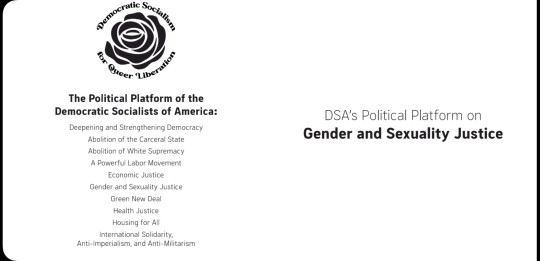
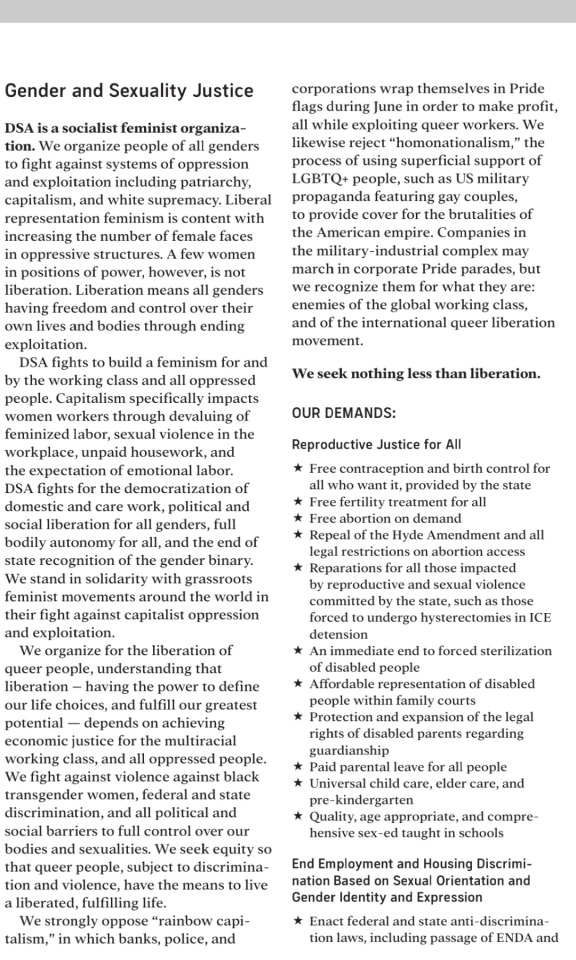
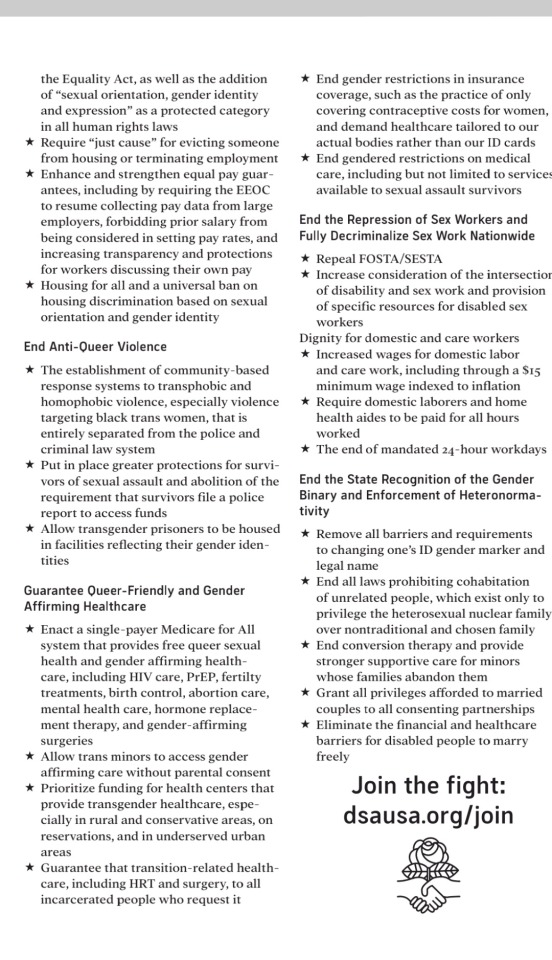
The Political Platform of the Democratic Socialists of America:
Abolition of the Carceral State
Abolition of White Supremacy
A Powerful Labor Movement
Economic Justice
Gender and Sexuality Justice
Green New Deal
Health Justice
Housing for All
International Solidarity,
Anti-Imperialism, and Anti-Militarism
DSA' Political Platform on
Gender and Sexuality Justice
DSA is a socialist feminist organization. We organize people of all genders to fight against systems of oppression and exploitation, including patriarchy, capitalism, and white supremacy.
Liberal representation feminism is content with increasing the number of female faces in oppressive structures. A few women in positions of power, however, is not liberation. Liberation means all genders having freedom and control over their own lives and bodies through ending exploitation.
DSA fights to build a feminism for and by the working class and all oppressed people. Capitalism specifically impacts women workers through devaluing of feminized labor, sexual violence in the workplace, unpaid housework, and the expectation of emotional labor.
DSA fights for the democratization of domestic and care work, political and social liberation for all genders, full bodily autonomy for all, and the end of state recognition of the gender binary.
We stand in solidarity with grassroots feminist movements around the world in their fight against capitalist oppression and exploitation.
We organize for the liberation of queer people, understanding that liberation – having the power to define our life choices, and fulfill our greatest potential — depends on achieving economic justice for the multiracial working class, and all oppressed people.
We fight against violence against black transgender women, federal and state discrimination, and all political and social barriers to full control over ourbodies and sexualities. We seek equity so that queer people, subject to discrimination and violence, have the means to livea liberated, fulfilling life.
We strongly oppose “rainbow capitalism,” in which banks, police, andcorporations wrap themselves in Pride flags during June in order to make profit, all while exploiting queer workers.
We likewise reject “homonationalism,” the process of using superficial support of LGBTQ+ people, such as US military propaganda featuring gay couples, to provide cover for the brutalities of the American empire. Companies in the military-industrial complex may march in corporate Pride parades, but we recognize them for what they are: enemies of the global working class, and of the international queer liberation movement.
We seek nothing less than liberation.
OUR DEMANDS:
Reproductive Justice for All
Free contraception and birth control for all who want it, provided by the state
Free fertility treatment for all
Free abortion on demand
Repeal of the Hyde Amendment and all legal restrictions on abortion access
Reparations for all those impacted by reproductive and sexual violence committed by the state, such as those forced to undergo hysterectomies in ICE detension
An immediate end to forced sterilization of disabled people
Affordable representation of disabled people within family courts
Protection and expansion of the legal rights of disabled parents regarding guardianship
Paid parental leave for all people
Universal child care, elder care, and pre-kindergarten
Quality, age appropriate, and comprehensive sex-ed taught in schools
End Employment and Housing Discrimination Based on Sexual Orientation and Gender Identity and Expression
Enact federal and state anti-discrimination laws, including passage of ENDA and the Equality Act, as well as the addition of “sexual orientation, gender identity and expression” as a protected category in all human rights laws
Require “just cause” for evicting someone from housing or terminating employment
Enhance and strengthen equal pay guarantees, including by requiring the EEOC to resume collecting pay data from large employers, forbidding prior salary from being considered in setting pay rates, and increasing transparency and protections for workers discussing their own pay
Housing for all and a universal ban on housing discrimination based on sexual orientation and gender identity
End Anti-Queer Violence
The establishment of community-based response systems to transphobic and homophobic violence, especially violence targeting black trans women, that is entirely separated from the police and criminal law system
Put in place greater protections for survivors of sexual assault and abolition of the requirement that survivors file a police report to access funds
Allow transgender prisoners to be housed in facilities reflecting their gender identities
Guarantee Queer-Friendly and Gender Affirming Healthcare
Enact a single-payer Medicare for All system that provides free queer sexual health and gender affirming healthcare, including HIV care, PrEP, fertilty treatments, birth control, abortion care, mental health care, hormone replacement therapy, and gender-affirming surgeries
Allow trans minors to access gender affirming care without parental consent
Prioritize funding for health centers that provide transgender healthcare, especially in rural and conservative areas, on reservations, and in underserved urban areas
Guarantee that transition-related healthcare, including HRT and surgery, to all incarcerated people who request it
End gender restrictions in insurance coverage, such as the practice of only covering contraceptive costs for women, and demand healthcare tailored to our actual bodies rather than our ID cards
End gendered restrictions on medical care, including but not limited to services available to sexual assault survivors
End the Repression of Sex Workers and Fully Decriminalize Sex Work Nationwide
Repeal FOSTA/SESTA
Increase consideration of the intersection of disability and sex work and provision of specific resources for disabled sex workers
Dignity for domestic and care workers
Increased wages for domestic labor and care work, including through a $15 minimum wage indexed to inflation
Require domestic laborers and home health aides to be paid for all hours worked
The end of mandated 24-hour workdays
End the State Recognition of the Gender Binary and Enforcement of Heteronormativity
Remove all barriers and requirements to changing one’s ID gender marker and legal name
End all laws prohibiting cohabitation of unrelated people, which exist only to privilege the heterosexual nuclear family over nontraditional and chosen family
End conversion therapy and provide stronger supportive care for minors whose families abandon them
Grant all privileges afforded to married couples to all consenting partnerships
Eliminate the financial and healthcare barriers for disabled people to marry freely
This pamphlet contains an excerpt from the Political Platform of the Democratic Socialists of America, ratified at the organization’s 2021 National Convention. The platform is a living document, up for amendment by our highest deliberative body, the national convention, every other year. You can read the current version of the full platform at ntdsa.org/nationaldsaplatform
Read the latest version of DSA’s full platform at
ntdsa.org/nationaldsaplatform
#us politics#democratic socalists of america#late stage capitalism#mutual aid#community organizing#trans rights#abortion rights#activism#political activist#political action#intersectional feminism#eat the rich#leftism#february 2024
9 notes
·
View notes
Text
The hare has hopped to Poland! Thank you so much @sapphicunderground! What a beautiful gift for the beginning of August!

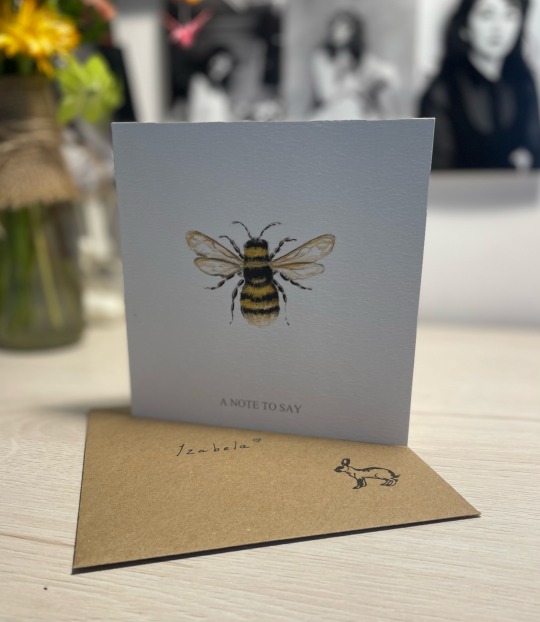

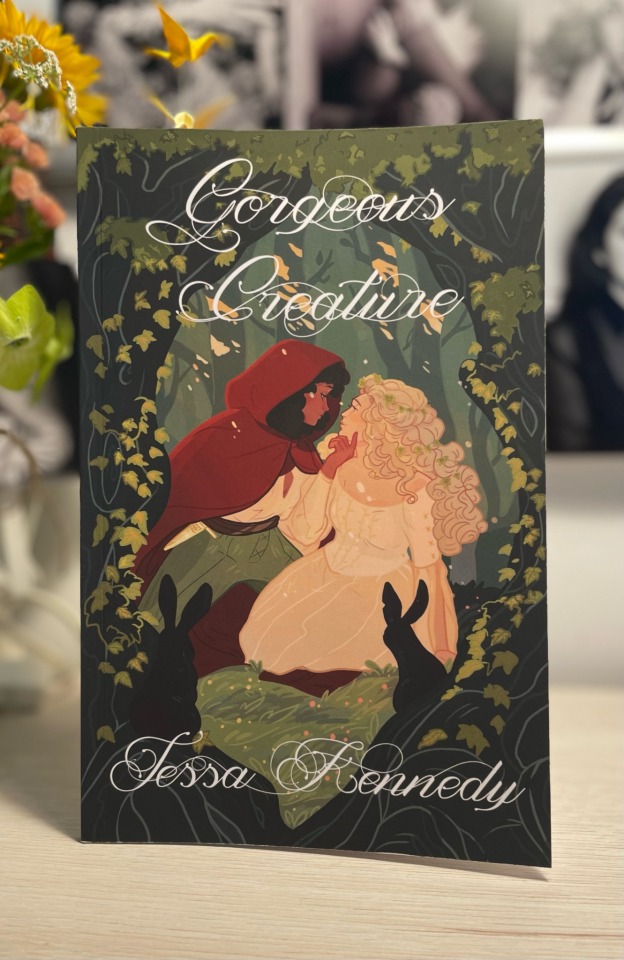
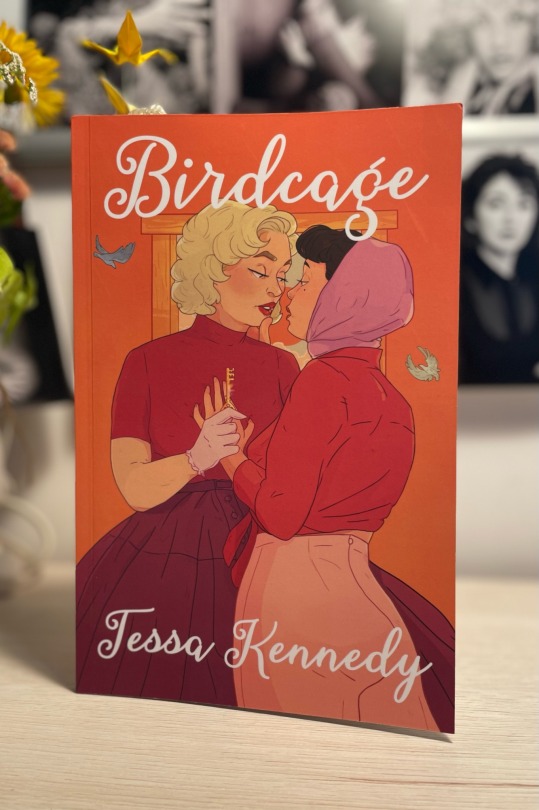
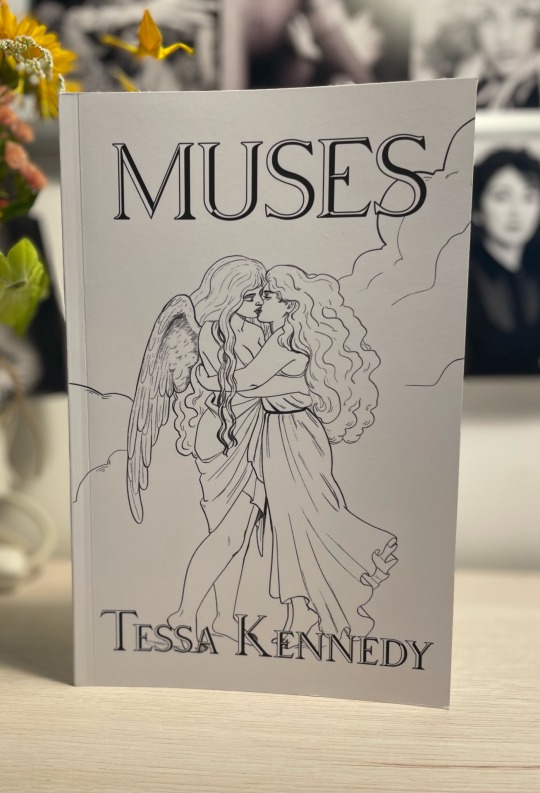

I absolutely love all the books, although I have to admit the most anticipated by me was "Dangerous Game." That's why I decided to start with it.
A few thoughts on some poems:
Hare Season
This one made me angry. The reality makes me angry. In today's world, the value of human beings is measured by their social status (aka the amount of money) and not by their heart and soul. Often making us think about ourselves as less. Long live capitalism.
Esther and Joan
I first read this piece on Instagram, and it amazed me how seamlessly and comprehensively it captures the relationship of the "The Bell Jar" characters in just a few lines. This is absolutely one of my favourite poems.
Fun fact: Tessa used cards 2 and 7 as a background for this poem, and I was 27 when I read it for the first time (I like little coincidences). Technically I still am 27, but only until Pluto Demoted Day (aka nothing to celebrate).
The Auckland Rape
Very strong and very accurate. All of the poems regarding sexual violence (and violence against women in general) are powerful, especially for me as Polish because of the current socio-political environment in Poland under the leadership of Law(lessness) and (in)Justice. Even with my Stoic nature, I'm unable to preserve calm.
***
I absolutely adore every single one of the poems in Dangerous Game, not only those mentioned above. It's even better and more intimate than I expected. Among my favourites are: Jaqueline, Lola, Mango, All In, We Were Only Talking, The Everlasting Sleep, The Chessboard, Someone Like You, and Blood Stains. And the cover is just marvellous.
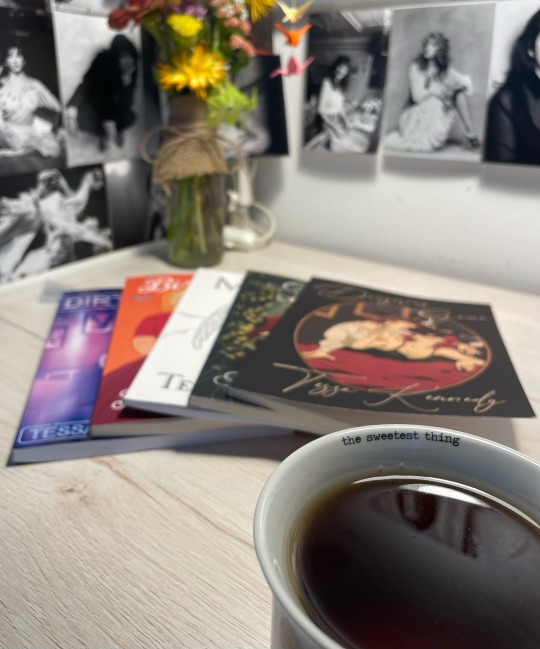
Soon I'll start reading the other books!
It's a pleasure to support such a talented woman!
#sapphic#sapphic literature#sapphic poetry#sapphic poems#lesbian literature#lesbian poetry#lesbian poems#wlw literature#wlw poetry#wlw poems#book#sapphic book#wlw book#lesbian book#wlw#lesbian#reading#book and tea#my
25 notes
·
View notes
Text
Plan Zona Especial Norte
On December 3, 1982, PSOE formed its first government in Spain. José Barrionuevo was appointed Minister of the Interior, who just two months after he took office presented the so-called Plan ZEN - Zona Especial Norte (Special Northern Area) -, a counterinsurgency program aimed at fighting on all fronts against the Basque independence movement.
The project launched had been designed by Civil Guard General Andrés Cassinello, specialized in "psychological action and anti-subversive information" and graduated in counterinsurgency in 1966 from the Fort Bragg Special Warfare Center (United States). He had belonged to Franco's information services, from where he went to Spanish intelligence. Investigative journalist Alfredo Grimaldos - author of the book "The CIA in Spain" - was asked if the CIA had controlled the GAL. His answer was clear: «Not directly, but the brain of the GAL was a CIA man in Spain, General Andrés Cassinello. But he took off and in the middle when they implicated Rodríguez Galindo for fear of getting off badly ».
The Plan included laws that authorized, for example, isolated detention of up to 10 days and allowed opaque spaces of absolute impunity. Some of the measures of that first "Anti-Terrorist Plan" were even declared unconstitutional years later, but the evil was already sown. Some elements mutated and were incorporated into ordinary legislation, with which the comprehensive plan of the Spanish State was perpetuated on that same unethical ground.
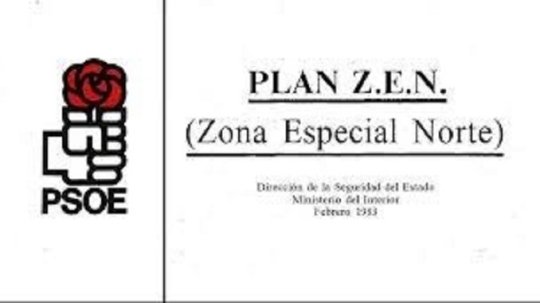
As objectives to achieve, it established "to achieve the permanence in the Special Area of the personnel of the State Security Corps" or "carry out actions aimed at making the Basque population aware that the disarticulation of the terrorist apparatus entails greater public security and better defense of the Basque traditions».
Funny enough, at different times it refers to the particular idiosyncrasy of the Basque people, to culture and traditions, contrasting the "bad terrorist" with the "good Basque". On the one hand, the document places the perversion of those who live in the rebel independence alienation and, on the other, the docile, good-natured and hard-working Basques who live without contradictions with Spain.
In the text of the Plan ZEN, a fundamental idea was constantly repeated: «The Police suffer acts of violence for being an impediment to those who seek to impose by force a system contrary to the Basque cultural tradition and respect for the freedom and rights of others."
With regard to Basque society, it set objectives such as “convincing the citizen that the State Security Forces and Bodies are there to protect and provide security and that the common enemy is criminals and terrorists. Achieve the respect, support and collaboration of citizens towards the State Security Corps and Forces. Have citizen support to marginalize the Terrorist Organization isolating it from the rest of society. "Be especially wary of young people, especially if they wear a dark anoraks, jeans, sneakers and a sports bag," the text warned.
It also alluded to the relatives and friends of the Basque political prisoners, aspiring to "get the population (especially the relatives of the detained prisoners) to be convinced that the detainees receive dignified treatment." And this in a period (1980-85) that marked a peak of torture cases after Franco's death.

Of course, the ZEN Plan - whose original and complete version still remains as a secret document - placed special emphasis on "psychological warfare" and a prominent role was given to the use of journalists and the media, recommending the practice of lying, the manipulation of information, the spread of rumors, or even the purchase of journalists.
In one of its points it proposed "attributing part of the credit in the police successes obtained to citizen collaboration (...), giving periodic information, through third parties, that disseminates confrontations and discrepancies between terrorists, their foreign ideologies, their businesses dirty, their criticizable customs, etc. It is enough that the information is credible to exploit it.
The Plan, in a nutshell, advocated for lies in the media, denunciations, infiltrators, the creation of a network of informers, the promotion of the figure of the repentant, the extension of the concept "we/them", the criminalization of stereotypes according to aesthetics, clothing, the insistence that the treatment of detainees was correct... In other words, the entire catalog of what the Spanish State has been applying throughout these forty years since then.
All the names that appear throughout this text linked to the Plan ZEN have been related at some point to the dirty state war; some directly, having been tried and sentenced even though their time in prison was fleeting; others, such as the so-called "X of the GALs", go unpunished and are proud of the task accomplished.
Source
#euskal herria#basque country#pays basque#pais vasco#euskadi#History#Politics#Psoe#Gal#Plan zen#Oppression
29 notes
·
View notes
Text
STATEMENT OF UNRWA COMMISSIONER-GENERAL PHILIPPE LAZZARINI
03/11/23 / TO THE UNITED NATIONS GENERAL ASSEMBLY FOURTH COMMITTEE
[…]
I was in Gaza two days ago for the first time since this conflict started.
The day I spent with the UNRWA team on the ground was one of the saddest of my entire 30-year humanitarian career.
I visited a school, hosting thousands of displaced persons. The place was overcrowded. The level of distress and the unsanitary living conditions were beyond comprehension. Everyone was asking for water and food. Instead of being at school to learn, children were asking for a sip of water and a loaf of bread. It was heartbreaking.
The school I visited was damaged by bombardments. One person was killed and 80 were injured. Yesterday, four schools in Gaza, sheltering nearly 20,000 displaced persons, were hit during bombardments leading to the deaths of at least 23, and injuring at least 35.
Since the beginning of the war, nearly 50 UNRWA buildings and assets have been impacted, with some being directly hit.
Entire families moved to our shelters with the hope that they would be safe, in a UN building, under the UN flag.
[…]
Depriving a whole population of items essential for survival is collective punishment. It is a violation of international humanitarian law.
The streets of Gaza have started overflowing with sewage, which will cause a massive health hazard very soon.
Recurring communications blackouts aggravate panic and distress among civilians.
We have lost 72 UNRWA colleagues in less than a month. It is the highest number of aid workers killed in a conflict in such a short time in the history of the UN.
[…]
Let me be clear – a handful of convoys being allowed through Rafah does not make for a meaningful humanitarian operation, nor is it commensurate with the intense political and diplomatic shuttling that has been taking place.
[…]
It is my duty to bring to the attention of this Assembly that hunger, despair, and a feeling of abandonment are turning into anger against the international community. Gazans cannot comprehend how the world can watch this tragedy unfold without protecting and assisting civilians.
[…]
There is trouble brewing far beyond the borders of the Gaza Strip.
The West Bank, including East Jerusalem, is simmering with tension, as violence has reached unprecedented levels not seen in the last 15 years.
Rising settler attacks and movement restrictions have displaced over 800 people in the West Bank since October 7th.
The Israeli military is conducting daily incursions into refugee camps.
According to OCHA, the total number of Palestinians killed by Israeli forces or settlers since October 7th is 123, including 34 children.
16 notes
·
View notes